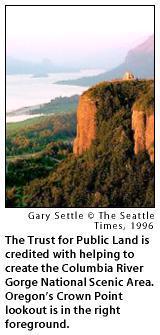
Part 3 / The Environmentalists
Copyright ©
1998 The Seattle Times Company
Posted at 05:55 a.m. PDT; Tuesday, September 29, 1998
Third parties often are key to land swaps

Without the Trust for Public Land, it's doubtful there would be a Columbia River Gorge National Scenic Area.
The nonprofit group lobbied Congress for creation of the scenic area, bought key parcels even before the legislation passed and negotiated the purchase of nearly a third of the land now in the hands of the U.S. Forest Service.
The Trust for Public Land (TPL) acts as a realty agency with a conservation bent: It buys low when it can, sells back to the government at full market value and uses the difference to buy more property - everything from an old commune on the Gorge to a 600-year-old cedar forest in Whatcom County.
"By protecting these incredible landscapes, we're generating revenues for our mission," said TPL Northwest Director Bowen Blair. "We need these margins to pursue our agenda."
In theory, that agenda helps public agencies acquire lands high on their priority list.
But top federal officials say they are worried that third-party organizations like TPL are setting priorities for the government.
"We need to regain control," said Jim Lyons, who oversees the Forest Service for the Department of Agriculture. "They are important partners in getting some of these land deals done. Our concern is when they overwhelm the system and we're not clearly in control."
That's how Forest Service investigators say taxpayers got shortchanged by millions of dollars in a Las Vegas land exchange put together by another conservation group, the San Francisco-based American Land Conservancy (ALC).
In the wake of that investigation, Lyons has ordered all third-party-brokered land deals worth more than $250,000 be reviewed by a national oversight team.
The heavy reliance of the Forest Service on nonprofit and for-profit go-betweens was apparent at a conference in Salt Lake City earlier this year to explore those organizations' special role in acquiring land for the agency. In attendance were representatives of TPL, ALC and a dozen other groups that specialize in government land exchanges and purchases.
The message from agency officials was that they would be relying even more heavily on those groups in light of drastic staff and budget reductions. For example, the Forest Service says it has only 64 appraisers on staff today, compared with 155 in 1992.
So, proposing land deals isn't enough, the groups were told. They need to take on more of the agency's workload, including appraisals and environmental analyses. The reward: Their deals would have a better shot at going to the top of the list for consideration.
Russ Thornock, who runs a for-profit land-trade firm in Arizona, told the group he has had success by providing full service in the deals. His company, Federal Land Exchange, has a near-monopoly on so-called third-party land exchanges with the Forest Service in Arizona.
Thornock's firm rounds up investors to buy private property in and near forests, identifies the public land they want in return, then provides the appraisal and environmental analysis that the agency uses to justify the deal. He has a financial stake in the outcome, because his fees are contingent on the success of the deal.
"We truly do this as a business and try to make a living off of it. But in our mind it's really a win-win for everyone involved," Thornock said. "The government wins, our proponents win and we make a fee."
|

